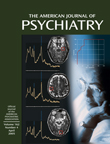To the Editor: We read with interest the study by Dr. Wagner et al. We have a number of concerns about this study. In the Method section, it is not clear how the patients were recruited. One is also left in the dark about the method of random assignment and if the random assignment list was concealed. The authors also give no indication of how they arrived at the sample size and if a power calculation was done. Given the recent concerns about the risk of suicidal thoughts and behaviors in children treated with SSRIs, this study could have attempted to shed additional light on the subject. The authors called the analysis of data an intent-to-treat analysis, although four patients who were lost to follow-up were excluded. In a true intent-to-treat analysis, all patients are analyzed in the groups to which they were initially assigned, regardless of whether they received the treatment or not. We consider the use of the term “intent-to-treat” in this context misleading.
Dropouts from the study have been accounted for by using the last observation carried forward. Treatment response in depression is frequently followed by a subsequent return to original or baseline values on a scale such that the last observation carried forward may be an unduly optimistic estimate. The classification of dropouts as treatment failures is based on safer assumptions than the last observation carried forward.
Our greatest concern is with the results and conclusions drawn. There is no table showing the results in detail. The authors have only stated that 36% of citalopram-treated patients met the criteria for response, compared to 24% of patients receiving placebo. This response rate, while in itself marginal compared to other studies of antidepressants, does not in itself show that citalopram is better than placebo.
We calculated the absolute benefit increase of using citalopram as 0.12 (95% confidence interval [CI]=–0.015 to 0.255). The relative benefit increase that could be attributed to citalopram was 50% (95% CI=–135% to 6%). The odds ratio, i.e., the odds of improving while taking citalopram compared to placebo was 1.75 (95% CI 0.92 to 3.43). The number needed to treat, i.e., the number of children who need to be treated with citalopram for one additional positive outcome was eight (95% CI=4 to infinity). None of these shows that citalopram is any better than placebo.
We would argue that the authors did not provide sufficient evidence to support their claim that “citalopram produces a statistically and clinically significant reduction in depressive symptoms in children and adolescents” (p. 1082). We are surprised that the most respected psychiatric journal in the world published a study that is misleading to its readers in the extreme.

